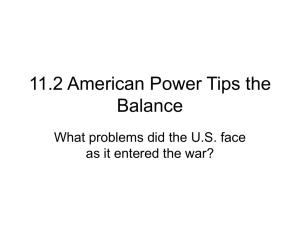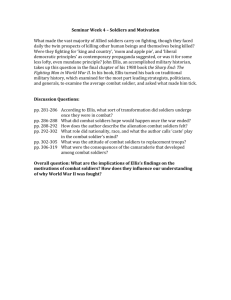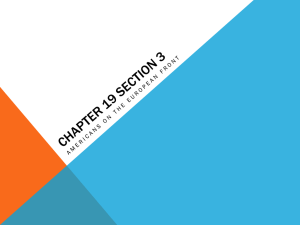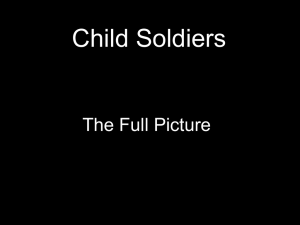Cyprus
advertisement
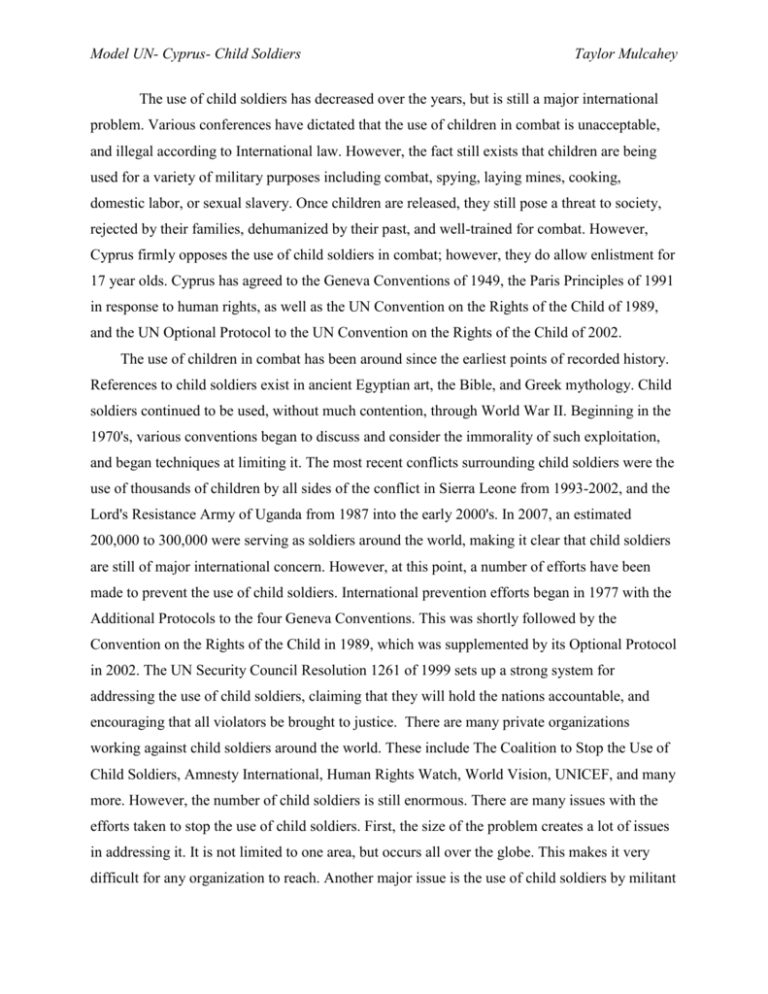
Model UN- Cyprus- Child Soldiers Taylor Mulcahey The use of child soldiers has decreased over the years, but is still a major international problem. Various conferences have dictated that the use of children in combat is unacceptable, and illegal according to International law. However, the fact still exists that children are being used for a variety of military purposes including combat, spying, laying mines, cooking, domestic labor, or sexual slavery. Once children are released, they still pose a threat to society, rejected by their families, dehumanized by their past, and well-trained for combat. However, Cyprus firmly opposes the use of child soldiers in combat; however, they do allow enlistment for 17 year olds. Cyprus has agreed to the Geneva Conventions of 1949, the Paris Principles of 1991 in response to human rights, as well as the UN Convention on the Rights of the Child of 1989, and the UN Optional Protocol to the UN Convention on the Rights of the Child of 2002. The use of children in combat has been around since the earliest points of recorded history. References to child soldiers exist in ancient Egyptian art, the Bible, and Greek mythology. Child soldiers continued to be used, without much contention, through World War II. Beginning in the 1970's, various conventions began to discuss and consider the immorality of such exploitation, and began techniques at limiting it. The most recent conflicts surrounding child soldiers were the use of thousands of children by all sides of the conflict in Sierra Leone from 1993-2002, and the Lord's Resistance Army of Uganda from 1987 into the early 2000's. In 2007, an estimated 200,000 to 300,000 were serving as soldiers around the world, making it clear that child soldiers are still of major international concern. However, at this point, a number of efforts have been made to prevent the use of child soldiers. International prevention efforts began in 1977 with the Additional Protocols to the four Geneva Conventions. This was shortly followed by the Convention on the Rights of the Child in 1989, which was supplemented by its Optional Protocol in 2002. The UN Security Council Resolution 1261 of 1999 sets up a strong system for addressing the use of child soldiers, claiming that they will hold the nations accountable, and encouraging that all violators be brought to justice. There are many private organizations working against child soldiers around the world. These include The Coalition to Stop the Use of Child Soldiers, Amnesty International, Human Rights Watch, World Vision, UNICEF, and many more. However, the number of child soldiers is still enormous. There are many issues with the efforts taken to stop the use of child soldiers. First, the size of the problem creates a lot of issues in addressing it. It is not limited to one area, but occurs all over the globe. This makes it very difficult for any organization to reach. Another major issue is the use of child soldiers by militant Model UN- Cyprus- Child Soldiers Taylor Mulcahey groups which do not hold themselves to international law. The governments of countries where conflicts occur do not hold militants accountable as well. Finally, efforts to release child soldiers, even if successful, do not complete the process. The children are rejected by their families, and very rarely integrated back into society. The magnitude of such an issue makes the solution process very challenging for many organizations around the world. However, there are certain actions that can be taken to address the issues that still exist internationally with child soldiers. A major solution to the problem would be to continue to stress, but with more force, the need for countries to hold people accountable to the international crimes they are committing by recruiting child soldiers, and using them in combat. Also, governments and organizations need to focus more on the source of the problems, rather than simply taking kids out of slavery, they need to stop the problem at its roots. This means there needs to be less focus on getting children out of combat, and more on preventing them from being involved in the first place. Finally, there needs to be a better strategy for reintegration. This begins by educating the tribes, and changing an ancient stigma against kids who are unwillingly taken from their village or community. The child is not to be blamed, and this mindset starts with education of the community. Cyprus opposes the use of child soldiers in combat, although, in Cyprus, they do allow enlistment, without combat, at age 17. They have been at the forefront of many human rights movements, and in full support of the movements as well. Cyprus has demonstrated, on numerous accounts, their contempt for the use of child soldiers.


